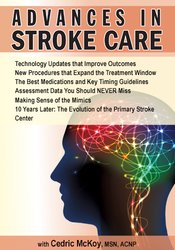

52-year-old John presents to the ER reporting that he has a headache that just doesn’t go away and his vision is a little blurry. He is sure it is just another sinus infection. As you are taking his history you notice he is slurring some of his words and suddenly he slumps over. Are you prepared for the emergency that is happening right in front of you? Patients may present with or develop neurological symptoms at any time, making it essential that healthcare providers possess the ability – and the confidence – to quickly assess these changes and intervene appropriately. Stroke patients have a short window for treatment and they depend on your expertise. Join Cedric McKoy, MSN, ACNP, for this in-depth look at the advances in stroke management. Every nurse needs to know these critical concepts in order to provide the best and most up-to-date care to patients and their families. Cedric is well known for his ability to make complex concepts understandable and provides useful tips and tools you can immediately put into practice.
Register today and be prepared to make the difference between a good and bad outcome when faced with your next stroke emergency.
NOTE: Tuition includes one free CE Certificate (participant will be able to print the certificate of completion after completing the on-line post-test (80% passing score) and completing the evaluation).
Continuing Education Information: Listed below are the continuing education credit(s) currently available for this non-interactive self-study package. Please note, your state licensing board dictates whether self-study is an acceptable form of continuing education. Please refer to your state rules and regulations. If your profession is not listed, please contact your licensing board to determine your continuing education requirements and check for reciprocal approval. For other credit inquiries not specified below, please contact cepesi@pesi.com or 800-844-8260 before the event.
Materials that are included in this course may include interventions and modalities that are beyond the authorized practice of your profession. As a licensed professional, you are responsible for reviewing the scope of practice, including activities that are defined in law as beyond the boundaries of practice in accordance with and in compliance with your profession's standards.
PESI, Inc. is a provider approved by the California Board of Registered Nursing, Provider #: 17118 for 6.0 self-study contact hours.
** You will need to provide your license number to PESI. PESI must have this number on file in order for your hours to be valid.
PESI, Inc. is an approved provider by the Florida Board of Nursing. Provider #: FBN2858. These materials qualify for 6.0 self-study contact hours.

PESI, Inc. is an approved provider by the Iowa Board of Nursing. Provider #: 346. Nurses successfully completing these self-study materials will earn 6.3 self-study contact hours. Please email cepesi@pesi.com with your license number, include the title, speaker name and date. PESI must have this number on file in order for your hours to be valid.
This self-study activity qualifies for 6.25 continuing education clock hours as required by many national, state and local licensing boards and professional organizations. Save your activity advertisement and certificate of completion, and contact your own board or organization for specific requirements.
| File type | File name | Number of pages | |
|---|---|---|---|
| Manual 077550 (25.19 MB) | 115 Pages | Available after Purchase |

Cedric McKoy, MSN, ACNP, is a neuro-intensive care nurse practitioner and the Stroke Center Coordinator at the University of Chicago Medical Center (UCMC). UCMC serves close to 400 stroke patients annually and includes a neurointensive care unit for patients with ICH, ischemic stroke, subarachnoid hemorrhage, brain tumors, traumatic brain injuries, myasthenia gravis, Guillain-Barré syndrome, and acute disseminated encephalomyelitis.
As an acute care nurse practitioner, Cedric works with a team of neuro-intensivists to assess and develop care plans for ICU patients, as well as providing hospital-wide consultation for neuro patients. In his role as the Stroke Center Coordinator, Cedric trains critical care nurses and is responsible for TJC data collection for the hospital’s stroke patient population. He also contributed to the development of the Stroke Management Guidelines for the UCMC.
A graduate of the University of Wisconsin-Madison and Loyola University-Chicago, Cedric is a member of the American Association of Critical Care Nurses, American Stroke Association and the Stroke Action Alliance.
Speaker Disclosures:
Financial: Cedric McKoy is the Stroke Center Coordinator for The University of Chicago Medical Center. He receives a speaking honorarium from PESI, Inc.
Nonfinancial: Cedric McKoy has no relevant nonfinancial relationships to disclose.
Access never expires for this product.
Visit our FAQ page at www.pesi.com/faq or contact us at www.pesi.com/info
Stroke Prevention Updates
Challenges of the Neuro Exam
Identifying Stroke Mimics and Chameleons
Acute Stroke Care
Ischemic Strokes
Current Management Strategies
Hemorrhagic Strokes
Limiting Complications of Stroke
Stroke Medication from A to Z
Expanding the Role of the Primary Stroke Center
| 5 |
|
| 4 |
|
| 3 |
|
| 2 |
|
| 1 |
|
Satisfaction Guarantee
Your satisfaction is our goal and our guarantee. Concerns should be addressed to: PO Box 1000, Eau Claire, WI 54702-1000 or call 1-800-844-8260.
ADA Needs
We would be happy to accommodate your ADA needs; please call our Customer Service Department for more information at 1-800-844-8260.
PESI Mobile App
Access CE trainings on your phone or tablet through our free mobile app. Choose video or audio-only versions of live webcasts and online courses from the world’s best instructors, and complete your CE requirements anywhere, anytime, at your own pace.
Please wait ...